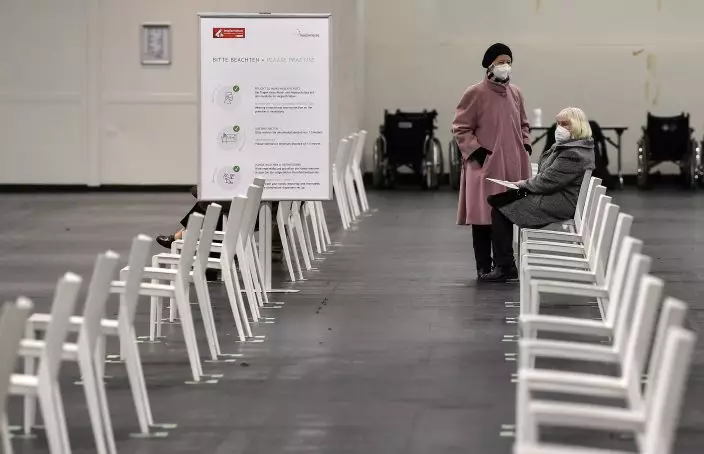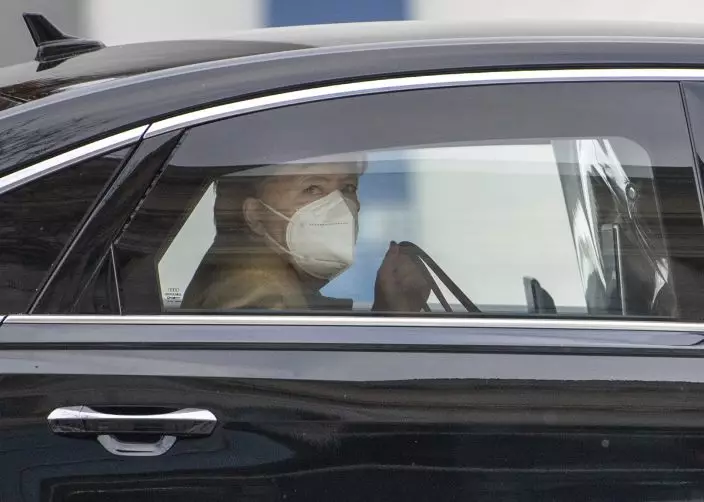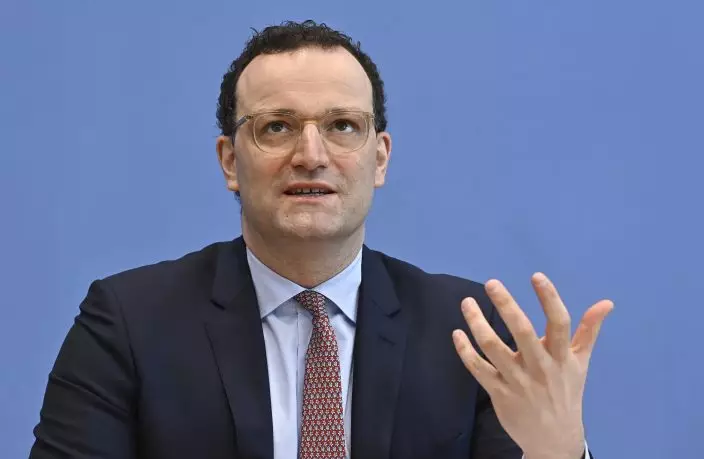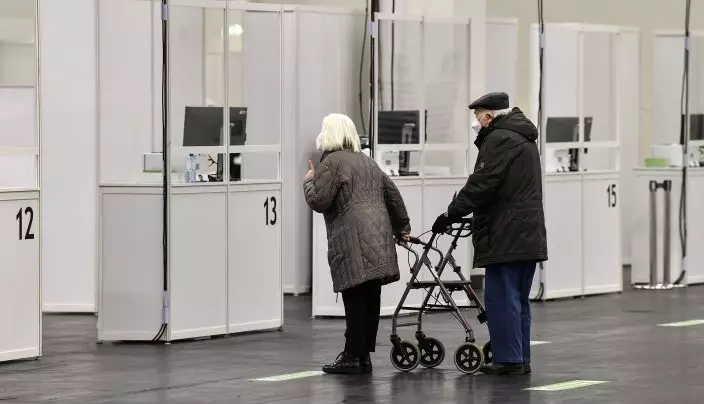German Chancellor Angela Merkel pushed back Friday against critics of the country's slow COVID-19 vaccine rollout, saying vast vaccination centers set up last year will be full to capacity by April.
In an interview with public broadcaster ZDF, Merkel acknowledged that there was “disappointment” at the slow start, but insisted that it was surprising there even was a vaccine just one year after the virus was first discovered.
“That's a huge achievement that nobody could have expected,” she said. “And then we didn't point out clearly enough that there wouldn't be enough vaccines for everybody at the start."

People sit in waiting area at the opening of the vaccination for the BioNTech-Pfizer vaccination against COVID-19 disease in Cologne, Germany, Monday, Feb. 8, 2021. Vaccination against the coronavirus started for senior citizens outside care homes today in Germany's most populated province North Rhine-Westphalia. (AP PhotoMartin Meissner)
Germany began vaccinating older people in December and has so far administered some 3.8 million shots. But the vast inoculation centers set up in exhibition halls and sports arenas have seen few patients, as many of the shots were given to people in nursing homes or hospitals.
The government has said that deliveries of the three vaccines already approved will be ramped up in coming weeks, and by Easter all people in the highest priority group will have been offered a shot.
“These centers will be at full capacity at the end of March, April,” said Merkel. “We will struggle to administer all (the vaccines) then, but in the first weeks there's a shortage and some people may have expected differently.”

Federal Chancellor Angela Merkel arrives in front of the Bundestag, Berlin, Germany, Thursday, Feb.11, 2021. She delivers a government statement on the results of the federal-state round on the management of the Corona pandemic. (Dorothee Barthdpadpa via AP)
She rejected claims that the European Union had been stingy when it came to ordering vaccines last year, saying the much faster rollout in Britain and the United States “wasn't a question of money.”
Some of the frustration in Germany has been due to the fact that the first vaccine, made by German company BioNTech and its U.S. partner Pfizer, wasn't authorized in the EU until weeks after it got the green light in Britain and America. A second German company, CureVac, on Friday announced that it has requested a rolling review of data for its vaccine with the European Medicines Agency with a view to swift authorization.
Germans have also been irked by widespread accounts of people jumping the vaccine queue. On Friday, the term ‘Impfdraengler’ — German for someone who pushes past others to get a vaccine — was trending on social media after reports that hospitals chiefs, mayors and even the Catholic bishop of Augsburg got their shot ahead of doctors and nurses.

German Health Minister Jens Spahn addresses a news conference on the coronavirusCOVID-19 pandemic in Berlin, Germany, Feb. 12, 2021. (Tobias SchwarzPool via AP)
Germany’s health minister, Jens Spahn, told reporters that the government would discuss with parliament “whether sanctions in this area could make sense.”
Patient rights campaigners warned Spahn last year that Germany’s complicated vaccination system could open the door to corruption and queue-jumping, but the health ministry had rebuffed repeated calls for criminal penalties.
In her interview with ZDF, Merkel voiced regret at having been too cautious in requiring face masks during the early stage of the pandemic last year, and then hesitating to impose a second lockdown when infection numbers rose again after the summer.

Seniors stand in waiting area, to get the BioNTech-Pfizer vaccination against COVID-19, at the opening of a vaccination center in Cologne, Germany, Monday, Feb. 8, 2021. Vaccination against the COVID-19 disease started for senior citizens outside care homes in Germany's federal state North Rhine-Westphalia. (AP PhotoMartin Meissner)
“In hindsight we were of course too hesitant in the fall,” she said. “I didn't have a good feeling at the time, but I supported the decision (to delay the lockdown).”
Merkel and the governors of Germany's 16 states agreed Wednesday to extend the current closure of stores and most public institutions until March 7, though schools and hairdressers will be able to open sooner.
The 7-day rolling average of daily new confirmed cases in Germany sank over the past two weeks, going from almost 15 new cases per 100,000 people on Jan. 28 to fewer than 10 new cases per 100,000 people on Feb. 11.
Follow AP coverage of the coronavirus pandemic at:
https://apnews.com/hub/coronavirus-pandemic
https://apnews.com/hub/coronavirus-vaccine
https://apnews.com/UnderstandingtheOutbreak


